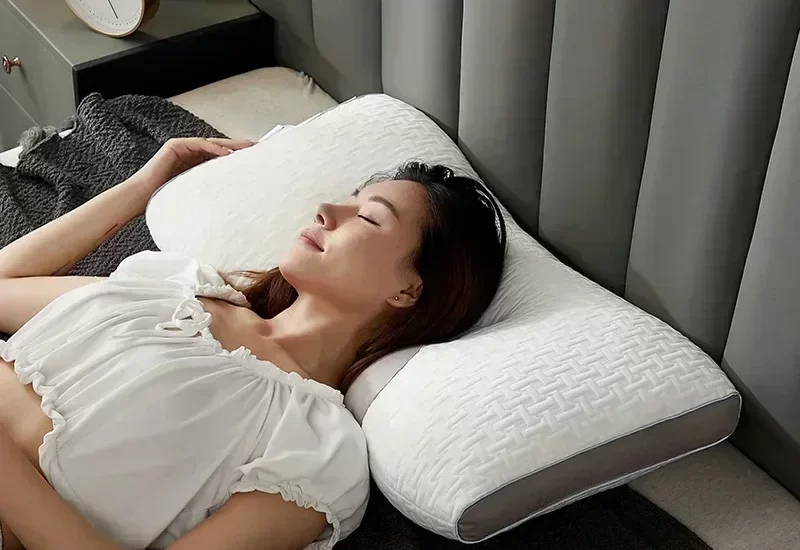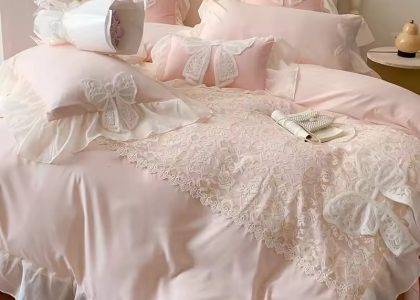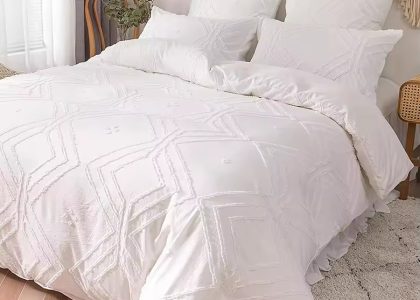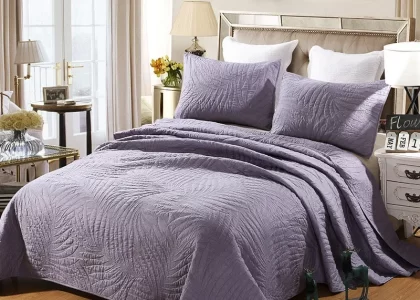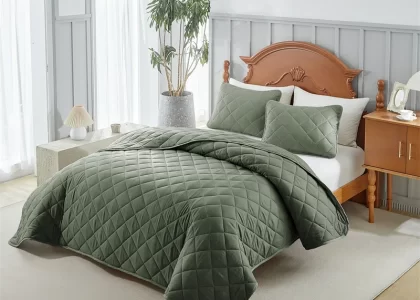Introduction to Canine Licking Behaviors
Dogs explore the world with their mouths. From a young age, puppies lick their surroundings as a means to learn. Why does my dog lick my pillow? Licking is not just for taste; it’s an investigation tool. For dogs, their tongues are key to discovering an object’s texture and scent. This behavior is natural and continues into adulthood, serving various purposes.

Understanding licking habits can be puzzling to dog owners. Licking behaviors often come from instinct, resembling how wild ancestors foraged and greeted each other. Domestic dogs retain these traits, including the licking of pillows. Many wonder, ‘why does my dog lick my pillow?’ The answers may lie in the combination of curiosity, comfort seeking, or even health issues. We’ll explore why dogs lick, what makes pillows appealing, and when to be concerned. Curbing unwanted licking involves both knowing the ‘why’ behind it and taking smart steps to redirect the behavior.
Pillows often carry our scent, which attracts dogs. This scent can offer them comfort or trigger their curiosity. If licking becomes excessive, it may signal a deeper issue. Identifying the cause is crucial for addressing the behavior effectively. As we go further into this exploration, we will uncover sensory, emotional, and health-related reasons behind pillow licking. Stay tuned as we delve into the sensory world that captivates our canine friends and compels them to lick.
The Sensory World of Dogs and Licking
Dogs rely on their senses to explore their environment. Unlike humans, dogs use their tongues as a primary sensory tool. This is due to their different physical abilities. They lack hands to touch and feel, and their vision isn’t as sharp as ours. Their tongues help them discover the taste, texture, and shape of objects around them.
Their sense of smell is also much more developed than humans. It’s linked to their sense of taste, which drives them to lick things they find interesting. By licking, dogs gather more information about their surroundings – like creating a detailed ‘file’ on different items. For them, pillows become an object worth investigating because they carry our scent and have an enticing texture.
Dogs’ fascination with pillows can seem strange to us, but to them, it’s a way of understanding the world. Pillows attract dogs because they smell like their owners and have a soft, enjoyable texture. If your dog licks your pillow, they are using their natural instincts to gather information and understand why it’s essential to us, their family.
In cases of excessive licking, it’s not just curiosity at play. It can relate to emotional reasons or a need for a particular mineral in their saliva. Understanding these sensory drives helps us respond to our dogs’ behaviors with empathy and care. It’s essential as pet owners to recognize the importance of these sensory experiences for our dogs’ overall well-being.
Insights into Pillow Licking: Comfort Seeking and Anxiety
Dogs may turn to pillow licking for emotional comfort. Your scent on the pillow can soothe them when you’re away, reducing their stress and anxiety. This behavior is often more pronounced in dogs who have separation anxiety. They may lick the pillow excessively, seeking relief from the distress they feel due to your absence.
Understanding Separation Anxiety in Dogs
Separation anxiety occurs when a dog becomes overly anxious as soon as their owner leaves. Signs of this condition can include excessive licking, whining, pacing, or destructiveness. Dogs with separation anxiety perceive your pillow as a source of your scent, which to them, is a comforting presence.

Pillow Licking as a Sign of Comfort Seeking
Besides anxiety, dogs might find the act of licking itself to be comforting. The repetitive motion can calm them, much like human behaviors such as knitting or tapping. If your dog licks your pillow more often when alone, it could be their way of self-soothing.
Addressing the underlying emotional issues is key to managing this habit. Offering alternatives for comfort can help, such as a piece of clothing with your scent or a special toy. Understanding these reasons can guide you in providing the best emotional support for your pet. Redirecting the behavior and training can significantly improve these anxiety-driven habits in dogs.
Salty Cravings: Dietary Influences on Licking
Dogs may lick pillows due to salty cravings. Human sweat and skin cells can leave salt on pillows. This occurs naturally as we sleep. Dogs missing salt in their diets may lick to try to ingest it. Addressing possible dietary deficiencies is key.
If you notice your dog intently licking your pillow, consider their diet. Lack of sodium can lead to such behaviors. Make sure their food provides the necessary nutrients. A balanced diet helps prevent excessive pillow licking for salts. Yet, always avoid self-diagnosing your pet’s health. Seek advice from a veterinarian if in doubt.
Some signs that dietary issues might be influencing licking include:
- Increased thirst or dehydration
- Changes in eating habits
- Excessive licking of other salty objects
Keep an eye out for these signs and take action if needed. Try to keep your pillows clean to reduce salty temptation. Regular washing of your bedding can help. This also keeps your dog and home more sanitary.
Remember, moderation in salt is important. Too much can be harmful to your dog’s health. Consulting a nutritionist or veterinarian can bring balance to their diet. This supports their overall well-being and may reduce unwanted licking.
Identifying Signs of Obsessive-Compulsive Disorder in Dogs
Like people, dogs can struggle with obsessive-compulsive disorder (OCD). This disorder may cause unusual behaviors, including persistent pillow licking. Recognizing the signs of OCD in dogs is vital for their mental health.
What is Dog OCD?
OCD in dogs involves repeated actions that they feel driven to do. These actions serve no real purpose and often repeat to the point of excess. Spotting OCD early can help address it and improve your dog’s quality of life.
Common OCD Behaviors in Dogs
OCD can show up in various ways. For some dogs, it may be continuous licking of objects like pillows. Others might repeatedly chase their tails or pace back and forth. Watch for behaviors that seem overdone or unnecessary.
Pillow Licking as a Potential OCD Sign
If your dog licks pillows non-stop, even after you’ve taken them away and returned them, it could be OCD. This is true especially if the licking continues for long periods and seems hard for them to stop.
Other Symptoms to Notice
Beyond licking, dogs with OCD might also show signs of stress or anxiety. Be aware of any changes in their behavior, like becoming aggressive or withdrawn. Increased barking or destructive actions can also be indicators.
If you suspect your dog may have OCD, it’s important to take action. Note the behaviors, frequency, and any triggers you can identify. Then, consult with your veterinarian for guidance. They can help to confirm if it’s OCD and advise on treatment options. Addressing OCD behaviors in dogs is crucial for their mental well-being and can prevent future health issues.

Practical Strategies for Redirecting Pillow Licking
Finding your dog licking your pillow can be worrying and unhygienic. To change this habit, try some practical strategies.
Identify the Trigger
Begin by figuring out why your dog licks. Is it separation anxiety, a need for salt, or an OCD behavior? Knowing this can help you address the root cause.
Provide Alternatives
Give your dog other things to lick. Offer chew toys or treats that can redirect their licking habit away from your pillows.
Increase Exercise
Physical activity can reduce anxiety and OCD tendencies. More exercise might lessen your dog’s urge to lick pillows.
Training and Commands
Teach your dog to follow commands like ‘leave it.’ Reward them when they obey and stop licking the pillow.
Environmental Changes
Make your bedroom off-limits. Store pillows where your dog can’t reach them.
Puzzle Feeders and Toys
Use puzzle toys to keep your dog’s mind busy. This can prevent them from focusing on your pillows.
Positive Reinforcement
Praise your dog when they choose not to lick the pillow. Use treats and affection as rewards for good behavior.
Remember, patience is key. Changing a licking habit takes time. If the issue persists, consider consulting a professional for further advice.
Consulting Your Veterinarian: When to Seek Professional Help
Sometimes, despite our best efforts, dogs continue to display unusual behaviors. If your dog’s pillow licking habit persists, or if you notice any concerning signs, it’s critical to seek professional help. Consulting a veterinarian can help you rule out any underlying health issues that might be causing this behavior.
Signs That It’s Time to Consult a Veterinarian
Here are key indicators that you should visit a vet:
- The behavior is excessive: If the licking turns into an all-consuming activity for your dog.
- Changes in appetite or thirst: Major shifts in eating and drinking habits can suggest health problems.
- Physical signs of distress: If licking leads to sore or damaged skin, or if your dog seems in pain.
- Behavioral changes: Watch for signs of anxiety, aggression, or any other drastic changes in behavior.
Veterinarians can perform a thorough examination and possibly recommend tests. They can identify issues such as infections, allergies, nutritional deficiencies, or psychological disorders.
Remedies That Require Veterinary Expertise
Certain conditions need medical intervention:
- Separation Anxiety: A vet might prescribe medication to help with anxiety.
- Nutrient Imbalances: Supplements or dietary changes could be necessary, under vet guidance.
- OCD Treatment: For dogs with possible OCD, specialized behavior therapy might be recommended.
Remember, your commitment to your dog’s health is key in addressing and managing pillow licking behaviors. Never hesitate to reach out to your vet if you suspect your dog’s behavior is more than a quirky habit. They are your partner in ensuring the well-being of your furry friend.
Conclusion: Ensuring Your Dog’s Well-being
Wrapping up, your dog’s pillow licking may puzzle you. Yet it’s mostly harmless. It’s their way to sense the world or find comfort. Sometimes, it points to health needs. Knowing why they do it guides you to act right. When they lick for salt, look at their diet. If it springs from anxiety, give them comfort through toys or scented items. If it’s OCD, a vet should step in.
This habit can change with patience and smart steps. Keep your pillows clean and your dog well-fed. Offer them plenty of play and exercise too. Note any odd changes in their actions or health. Face these with a vet’s help.
Always, your love and care make a big difference. Keep your eyes open and act with kindness. With your help, your dog can live a full, happy life.

